| Listing 1 - 10 of 10 |
Sort by
|
Book
ISBN: 1942495390 1942495404 Year: 2021 Publisher: Sioux City, Iowa : Parnassos Press - Fonte Aretusa,
Abstract | Keywords | Export | Availability | Bookmark
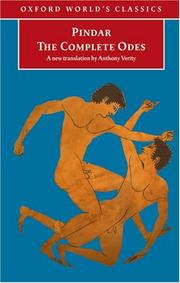
ISBN: 1281146838 9786611146832 0191517178 9780191517174 6611146830 0192805533 9780192805539 9781281146830 9780191604737 0191604739 Year: 2007 Publisher: Oxford New York Oxford University Press
Abstract | Keywords | Export | Availability | Bookmark
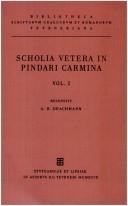
ISBN: 3110956470 9783110956474 3598715978 9783598715976 9783598715976 3519015978 Year: 1997 Publisher: Berlin New York De Gruyter
Abstract | Keywords | Export | Availability | Bookmark
 Loading...
Loading...Choose an application
- Reference Manager
- EndNote
- RefWorks (Direct export to RefWorks)
Scholia Vetera In Pindari Carmina: Scholia In Olympionicas: BD I (Bibliotheca Scriptorum Graecorum Et Romanorum Teubneriana): Volumen I
Greek poetry. --- Greek literature --- Pindar --- Pindarus --- Pindare --- Píndaro --- Pindaros --- Pindaro --- Πίνδαρος
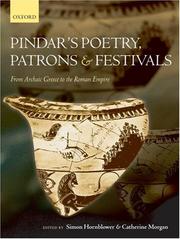
ISBN: 128115511X 9786611155117 0191537985 9780191537981 6611155112 0199296723 9780199296729 9780199296729 1383044090 Year: 2007 Publisher: Oxford New York Oxford Univ. Press
Abstract | Keywords | Export | Availability | Bookmark
 Loading...
Loading...Choose an application
- Reference Manager
- EndNote
- RefWorks (Direct export to RefWorks)
Presents a collection of essays about the praise ('epinikian') poetry of the classical poets Pindar and Bacchylides. The social and physical, as well as the literary, background to these poems celebrating athletic victory is explored in light of the archaeological and sociological insights.
Laudatory poetry, Greek --- History and criticism. --- Pindar --- Bacchylides --- Bacchylide --- Bakchylides --- Bakchulides --- Pindarus --- Pindare --- Píndaro --- Pindaros --- Criticism and interpretation. --- Vakchylidēs --- Bacchilide --- Bακχυλíδης --- Pindaro --- Πίνδαρος
Book
ISBN: 019936687X 0199366861 0199366853 1322341540 9780199366866 9780199366859 9780199366859 9780199366873 0190266619 Year: 2015 Publisher: Oxford New York
Abstract | Keywords | Export | Availability | Bookmark
 Loading...
Loading...Choose an application
- Reference Manager
- EndNote
- RefWorks (Direct export to RefWorks)
This study attempts a fully contextualized reading of the praise poetry written by Pindar for Hieron of Syracuse in the 470s B.C. It argues that the songs composed by Pindar for the Sicilian tyrant were part of an extensive cultural programme that included athletic competition, coinage, architecture, sanctuary dedication, city foundation, and much more.
Greek literature --- History and criticism. --- Pindar --- Criticism and interpretation. --- Syracuse (Italy) --- Greece --- History. --- Colonies. --- Pindare --- Píndaro --- Pindaros --- Syracuse, Sicily --- Siracusa (Italy) --- Sirakuza (Italy) --- Siracuse (Italy) --- Syrakus (Italy) --- Syracuse (Sicily) --- Pindarus --- Pindaro --- Πίνδαρος
Book
ISBN: 1283222604 9786613222602 0191557196 9780191557194 0199586705 9780199586707 9780199586707 0199586705 0191615161 Year: 2010 Publisher: Oxford Oxford University Press
Abstract | Keywords | Export | Availability | Bookmark
 Loading...
Loading...Choose an application
- Reference Manager
- EndNote
- RefWorks (Direct export to RefWorks)
A radical new appraisal of the veneration and cult of heroic men, living and dead, in ancient Greece. Bruno Currie finds the roots of the Hellenistic ruler cult, and hence Roman emperor cult, in the 5th century BC (and earlier), and identifies Pindar's victory odes as a crucial stage in this process.
Laudatory poetry, Greek --- Odes, Greek --- Athletics in literature. --- Heroes in literature. --- Games in literature. --- Greek odes --- Greek poetry --- History and criticism. --- Pindar --- Pindarus --- Pindare --- Píndaro --- Pindaros --- Criticism and interpretation. --- Characters --- Heroes. --- Greece --- In literature. --- Pindaro --- Πίνδαρος
Book
ISBN: 9004277390 9789004277397 9004274359 9789004274358 9789004274358 1322128030 Year: 2014 Publisher: Leiden, Netherlands : Brill,
Abstract | Keywords | Export | Availability | Bookmark
 Loading...
Loading...Choose an application
- Reference Manager
- EndNote
- RefWorks (Direct export to RefWorks)
Pindar’s Sixth Olympian Ode is considered one of the poet’s most brilliant victory odes. This is the first full-scale commentary on it. Adorjáni presents Greek text with critical apparatus, translation and metrical analysis. Three introductory chapters treat matters of history (background, date, performance) and literary criticism. Then follows a verse-by-verse commentary rooted in the tradition of philological exegesis, concentrating on grammatical, stylistic and interpretive features. Until now the Sixth Olympian has been praised chiefly for its magnificent and lucid presentation of the myth of Iamos, a seer of Arcadian origin and ancestor of the prophetic clan of the Iamidae. This commentary illuminates both the overwhelming depth of thought and the cunningly wrought structure of this masterpiece, contributing to a better understanding of Pindar’s verbal artistry. Pindars sechste olympische Ode ist einer der glänzendsten Siegesgesänge des Dichters. Hier wird der erste umfassende philologische Kommentar zum Gedicht vorgelegt. Adorjáni bietet einen griechischen Text mit kritischem Apparat, Übersetzung, metrischer Analyse und drei Einleitungskapiteln, die in die Probleme der Geschichtlichkeit (Hintergrund, Entstehungszeit, Aufführung) und der literarischen Interpretation hineinführen. Auf diesen Teil folgt ein von Vers zu Vers fortschreitender Kommentar, der gemäß den alten Traditionen der Texterklärung auf grammatische, stilistische und interpretatorische Fragen eingeht. Bisher wurde Olympie 6 zumeist als großartige und suggestive Erzählung des Mythos des Sehers Iamos, des Vorfahren der olympischen Iamiden, gewürdigt. Diesem Kommentar ist daran gelegen, die intrikate Gedankentiefe und vollkommenste Formkunst dieses Meisterwerks vor Augen zu führen.
Laudatory poetry, Greek --- Odes, Greek --- Greek odes --- Greek poetry --- History and criticism. --- Pindar. --- Pindar --- Pindarus --- Pindare --- Píndaro --- Pindaros --- Criticism and interpretation. --- Pindaro --- Πίνδαρος --- Laudatory poetry, Greek - History and criticism --- Odes, Greek - History and criticism --- Pindar. - Olympian odes --- Pindar. - Olympian odes. - 6 --- Pindar - Criticism and interpretation
Book
ISBN: 0691638829 1400853109 0691610754 9781400853106 0691054738 9780691054735 Year: 1986 Publisher: Princeton, N.J. Princeton University Press
Abstract | Keywords | Export | Availability | Bookmark
 Loading...
Loading...Choose an application
- Reference Manager
- EndNote
- RefWorks (Direct export to RefWorks)
Combining historical and philological method with contemporary literary analysis, this study of Pindar's longest and most elaborate victory ode, the Fourth Pythian, traces the underlying mythical patterns, implicit poetics, and processes of mythopoesis that animate his poetry.Originally published in 1986.The Princeton Legacy Library uses the latest print-on-demand technology to again make available previously out-of-print books from the distinguished backlist of Princeton University Press. These editions preserve the original texts of these important books while presenting them in durable paperback and hardcover editions. The goal of the Princeton Legacy Library is to vastly increase access to the rich scholarly heritage found in the thousands of books published by Princeton University Press since its founding in 1905.
Mythology, Greek, in literature. --- Apollo --- Medea, --- Pindar --- Pindar. --- Pindarus --- Pindare --- Píndaro --- Pindaros --- Μήδεια, --- Mēdeia, --- Apollōn --- Apellōn --- Απολλων --- Απελλων --- Helios --- In literature. --- Knowledge --- Mythology. --- Apollo (Greek deity) in literature --- Medea (Greek mythology) in literature --- Mythology, Greek, in literature --- Pindaro --- Πίνδαρος --- Mythologie grecque dans la littérature --- Apollon (Divinité grecque) dans la littérature --- Médée (Mythologie grecque) dans la littérature --- Criticism and interpretation. --- Critique et interprétation --- Mythology --- Pindar - Knowledge - Mythology --- Apollo (Greek deity) in literature.
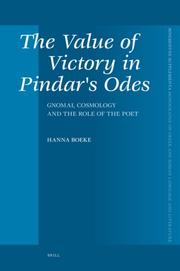
ISBN: 1281921777 9786611921774 9047422821 9789047422822 9781281921772 9789004158481 9004158480 661192177X Year: 2007 Volume: 285 Publisher: Leiden Boston
Abstract | Keywords | Export | Availability | Bookmark
 Loading...
Loading...Choose an application
- Reference Manager
- EndNote
- RefWorks (Direct export to RefWorks)
This book investigates the cosmological context of Pindar’s victory odes, and how it influences his presentation of praise. The study first focuses on gnomai as a reflection of cosmology, using these sayings to establish the views the poems reveal on matters such as the divine, the human condition and man in society. This overview is complemented by detailed literary analyses demonstrating how cosmology functions in individual odes. They show that Pindar shapes the poet persona to emphasize different aspects of the traditional world view or represent varying viewpoints so that he can praise each victor according to his particular circumstances. By focusing on cosmology the book highlights a neglected dimension of Pindar’s odes and challenges some traditional views on this poet.
Cosmology, Ancient, in literature. --- Praise in literature. --- Literatura grega clássica. --- Poesia lírica. --- Pindar --- PÍndaro --- Pindarus --- Pindare --- Píndaro --- Pindaros --- Criticism and interpretation. --- Cosmology, Ancient, in literature --- Praise in literature --- Pindaro --- Πίνδαρος --- Greek poetry --- Odes, Greek --- Cosmologie antique dans la littérature --- Eloges dans la littérature --- Poésie grecque --- Odes grecques --- Themes, motives. --- History and criticism --- Thèmes, motifs --- Histoire et critique --- Pindar. --- Criticism and interpretation --- Pindar - Criticism and interpretation
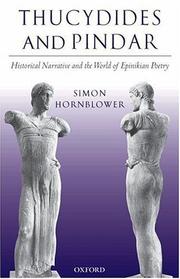
ISBN: 0199298289 9780199298280 9780199249190 0199249199 0191719420 9786610905096 0191530352 9786612199653 128219965X 1280905093 1435623703 9780191530357 9781282199651 Year: 2006 Publisher: Oxford New York Oxford University Press
Abstract | Keywords | Export | Availability | Bookmark
 Loading...
Loading...Choose an application
- Reference Manager
- EndNote
- RefWorks (Direct export to RefWorks)
Simon Hornblower demonstrates a thematic and literary kinship between Thucydides, one of the greatest of the ancient Greek historians, and Pindar, one of the greatest Greek poets who specialized in celebratory odes for victors in the Olympic Games.
Dichters [Griekse ] --- Poets [Greek ] --- Poètes grecs --- Poètes grecs anciens --- Influence (Literary, artistic, etc.) --- Laudatory poetry, Greek --- Olympic games (Ancient) --- Narration (Rhetoric) --- Olympic games (Ancient) in literature. --- Odes, Greek --- Greek language --- Athletes in literature. --- Rhetoric, Ancient. --- Influence littéraire, artistique, etc. --- Poésie élogieuse grecque --- Jeux olympiques de l'Antiquité --- Narration --- Jeux olympiques de l'Antiquité dans la littérature --- Odes grecques --- Grec (Langue) --- Sportifs dans la littérature --- Rhétorique ancienne --- History --- History and criticism. --- Style. --- Histoire --- Histoire et critique --- Style --- Thucydides --- Thucydides. --- Pindar --- Literary style. --- Influence. --- Greece --- Grèce --- Historiography. --- Historiographie --- Influence littéraire, artistique, etc. --- Poésie élogieuse grecque --- Jeux olympiques de l'Antiquité --- Jeux olympiques de l'Antiquité dans la littérature --- Sportifs dans la littérature --- Rhétorique ancienne --- Grèce --- Greek poetry --- History and criticism --- Historians --- Ancient rhetoric --- Classical languages --- Greek rhetoric --- Latin language --- Latin rhetoric --- Greek odes --- Ancient Olympic games --- Olympics --- Rhetoric --- Pindarus --- Pindare --- Píndaro --- Pindaros --- Thucydide --- Thukydides --- Thoukudides --- Knowledge --- Literature. --- Appreciation --- Pindaro --- Πίνδαρος --- Discourse analysis, Narrative --- Narratees (Rhetoric) --- Tucidide --- Fukidid --- Tucídides --- Thoukydidēs --- תוקידידיס --- Θουκυδίδης
| Listing 1 - 10 of 10 |
Sort by
|

 Search
Search Feedback
Feedback About UniCat
About UniCat  Help
Help News
News